
Donate to Innerviews
Since 1994, Innerviews has provided uncompromising, in-depth interviews with musicians across every genre imaginable. And it does that with no trackers, cookies, clickbait, or advertising.
Your donations are welcome to help continue its mission of highlighting incredible music and artists, without any commercial considerations.
Your contributions will be instantly transformed into stories and videos, and cover hosting and web management costs. Importantly, your dollars will help ensure Innerviews remains absolutely free to all visitors, independent of their ability to financially support it.
Please consider making a donation today by using the PayPal QR code below.

Mark Walker
Listening Beyond Ourselves
by Anil Prasad
Copyright © 2022 Anil Prasad.
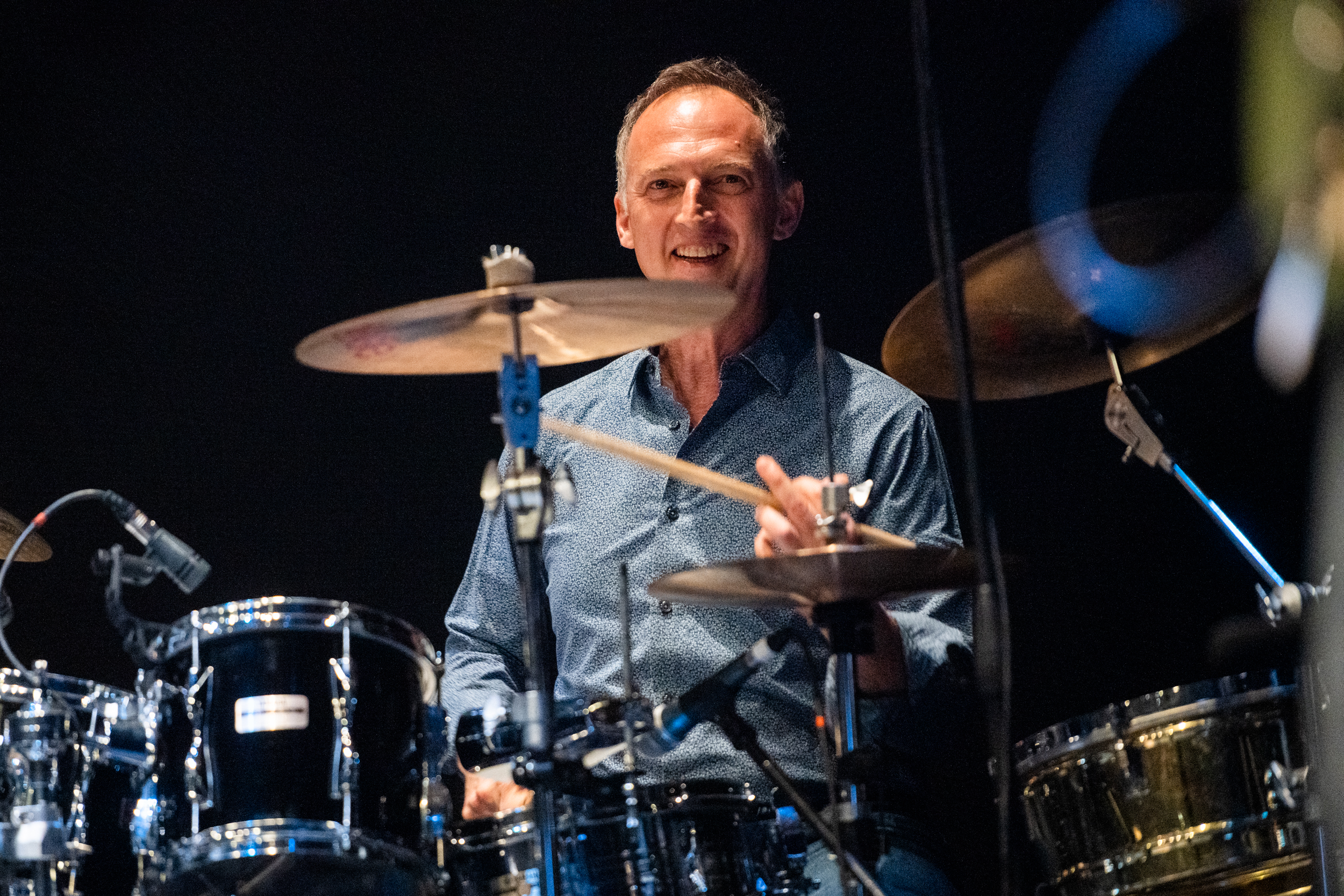 Photo: Mark Walker Collection
Photo: Mark Walker Collection
Mark Walker’s journey as a musician reflects a constant desire to evolve his skills and expand the boundaries of jazz. He’s a first-call drummer that has worked with some of the genre’s most revered musicians, including Oregon, Lyle Mays, Paquito D’Rivera, Arturo Sandoval, Eliane Elias, Dave Liebman, and Michel Camilo. It was those experiences that inspired him to dig even deeper into the music in recent years by exploring the art of composition and ensuring his own voice comes to the fore.
During the height of the COVID-19 pandemic in 2020, Walker began pursuing a master’s degree in jazz composition from UMass Amherst. His thesis was to create an original long-form big band suite titled “Spirit and Rhythm.” It was an enormous task and an experience that proved challenging and rewarding.
The big band suite wasn’t Walker’s first foray into composition. He contributed several tunes as a member of Oregon across the last 26 years, as well as wrote six pieces for his 2019 debut solo album You Get What You Give. The recording is a kinetic and engaging effort that combines jazz and Afro-Latin approaches, and features D’Rivera. In addition to his own works, it includes imaginative arrangements of Wayne Shorter's "Speak No Evil," John Coltrane's "Moment's Notice" and Thelonious Monk's "Bye-Ya."
Walker is both an educator and a student. It speaks to his humility and drive that while he pursued the master’s degree, he simultaneously served as a professor in the Percussion Department of the Berklee College of Music, a post he’s held since 2001. He’s taught countless percussionists and drummers, as well as helmed myriad classes, clinics, and workshops. He distilled some of that knowledge and wisdom into his two books World Jazz Drumming and Killer Grooves.
Walker is currently focused on touring with Sandoval and pursuing a recording of “Spirit and Rhythm.” He also recently contributed to pianist and composer Mariah Parker’s forthcoming jazz album, which features Oregon bandmate Paul McCandless.
Innerviews met with Walker late summer for a big picture, career-spanning conversation at the Water Street Bistro in Petaluma, California, during a break from Parker’s Bay Area studio sessions.
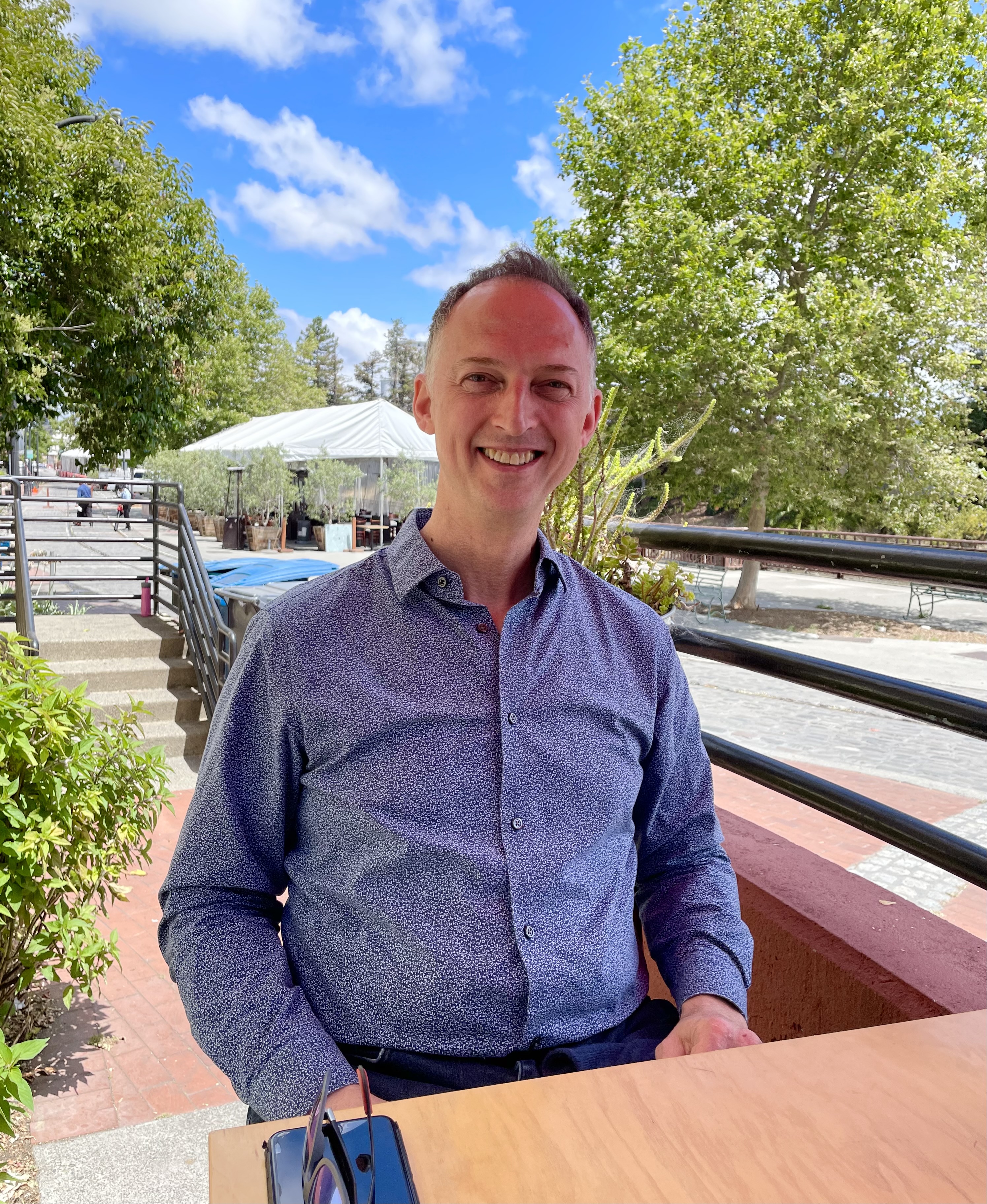 Mark Walker at Water Street Bistro, Petaluma, CA, Summer 2022 | Photo: Anil Prasad
Mark Walker at Water Street Bistro, Petaluma, CA, Summer 2022 | Photo: Anil Prasad
We’re emerging out of a pandemic state into a semblance of normalcy. Tell me about your experiences and evolution across this period.
When the pandemic happened, we all had to scramble onto Zoom and figure out how to teach, collaborate, and perform online. I’ve been collaborating remotely for many years with various musicians, and for that to be the sole method of expression was fun, but limiting at the same time. Once we got back to live performances, there was just no comparison. We did get to know the technology better, that's for sure. Fortunately, I have a studio with a full recording system. I got together virtually with other musicians to figure out how to make the most of the situation. We tweaked our sounds, and I found something good to work with for online teaching and clinics. The fact that we did all of that proves the resilience of musicians through this whole thing. No matter what we faced, we were going to keep on keepin’ on.
In a way, it was a personal reset. I couldn’t go out to perform, so I’d take daily walks and start to notice things I hadn’t before. I saw a new beauty in things like the winter sky on a cloudy day. I would record a new solo every night during lockdowns, and you can find excerpts of those solos on Instagram. I also started practicing yoga and meditation, which gave me a deeper connection with the self and music, despite the struggle of some of the poses. I still practice today.
I'm also grateful to companies including Yamaha, Paiste, Vic Firth, Remo, Meinl Percussion, and Prologix for including me on their artist rosters, and for their commitment to my career throughout this period and beyond.
In the fall of 2020, I enrolled in a master’s program at UMass Amherst in jazz composition. The first year of that was online, because of the pandemic. So, I was in my studio all the time. Instead of driving an hour and 45 minutes to and from Amherst, I walked 30 paces to my studio for classes. During the second year, it was on campus again, and I was driving to school at least two days a week, sometimes just to rehearse one piece I composed. It was a great experience because the teachers in the program really challenged me.
I studied with saxophonist Felipe Salles, a brilliant composer and leader of the Interconnections Ensemble, which is a large group. I’d performed and recorded with him over the years, and we’d recorded together for saxophonist Daniel Ian Smith’s New World Composers Octet. So, he convinced me to get into the program. In class, he showed me how he would create a melody out of somebody's name using different pitches and develop that into a whole big band arrangement in as little as a week. It was just astounding. We also did an independent study of George Russell’s Lydian Chromatic Concept, as well as writing for visual media and jazz analysis. Another professor, Jeff Holmes, who I had seen playing piano with the Paul Winter Consort, was also a part of the program and head of the jazz department. He’s a fantastic lead trumpeter, pianist, and composer who really helped me look at my music in a larger sense. Both professors really opened my eyes and ears a lot. It was a life-changing experience.
What made you want to study jazz composition formally in 2020, given your decades of experience as a musician?
It always goes back to Oregon and Lyle Mays. Lyle always created compositions, even when he soloed. Ralph Towner and Paquito D’Rivera did as well. I remember asking Ralph one time about the tune “Aeolus.” I said, "How can I improve my solo on that tune?" And without missing a beat, he simply replied, "Play the composition." So, all things pointed to composition and that's what sparked my desire to study it.
As Dr. Salles emphasized in my lessons, everything comes from the melody, and not necessarily only the chords. I know there is more than one approach to composition, but this concept opened up my mind. We all have the ability to compose inside of us.
You chose to create an original big band suite as the thesis for your degree. Describe it for me.
Yeah, I chose big band, probably stupidly given the complexity of doing that, but it was both a challenging and rewarding experience. I’ve always loved the big band sound and sonorities. When I was young, I saw Buddy Rich and a few other bands. I was knocked out by the energy of the arrangements and the rhythm.
I’ve been lucky to work with the NDR, WDR, and HR big bands over the years. I got to work with some of the best arrangers, like Bill Dobbins, Vince Mendoza, Michael Philip Mossman, and Jim McNeely. My first experience writing for large ensemble came many years ago, when Paquito D’Rivera called me and said, “I have an interesting proposition for you.” He wanted me to arrange a piece for a big band he got commissioned to do. So, I did that, but I didn’t know what I was doing. I basically just wrote what I heard in my head, using a piano and a laptop. I checked what I did with a few experienced writers, but at the rehearsal, at first, it sounded terrible. I had no concept of instrument ranges. But after tweaking a few things, it actually kind of sounded like music in the concert. [laughs] It was very gratifying to hear my own arrangement, and inspired me to study and write more.
One of the things I walked away from that experience with is that a big band project may seem completely impossible on the surface, but you can actually get it done if you put your mind to it.
I was so busy and late with writing assignments and I was wondering if I could even make it through the program. Even during the first semester, I thought “How am I going to do this?” I had the luxury of being at home, but I was struggling to write. I was starting to get used to hearing the phrase “very concerned” used by my teachers [laughs]. Practicing yoga definitely helped, as I was able to focus on the discipline and calming effect.
I had to find a theme for the whole suite, so I said to myself “Okay, where am I? At home, practicing and opening up spiritually and musically.” So, I called the suite “Spirit and Rhythm.” The first part is called “Ebb and Flow,” which basically represents breathing. And no-one grows without plenty of struggling, so “Struggle” is the name of another piece. “Awakening” and “Reflection” are the names of other ones. I tried to tie everything together I was practicing and experiencing with these themes. It was tough to write it. There were so many moments where I was just stuck and starting to fall asleep at the piano. I’d have to get on the drums and play something, or take a walk and come back. It was a struggle indeed. Some people are lucky, and composition just comes to them, naturally. Others can sit down and improvise pieces, then edit them.
I have a record label interested in releasing a recording of my big band project. So, I’m planning on recording it in early 2023. I have to figure out who’ll play on it, who’ll guest on it, and how the production costs will work. It will be completely self-financed.
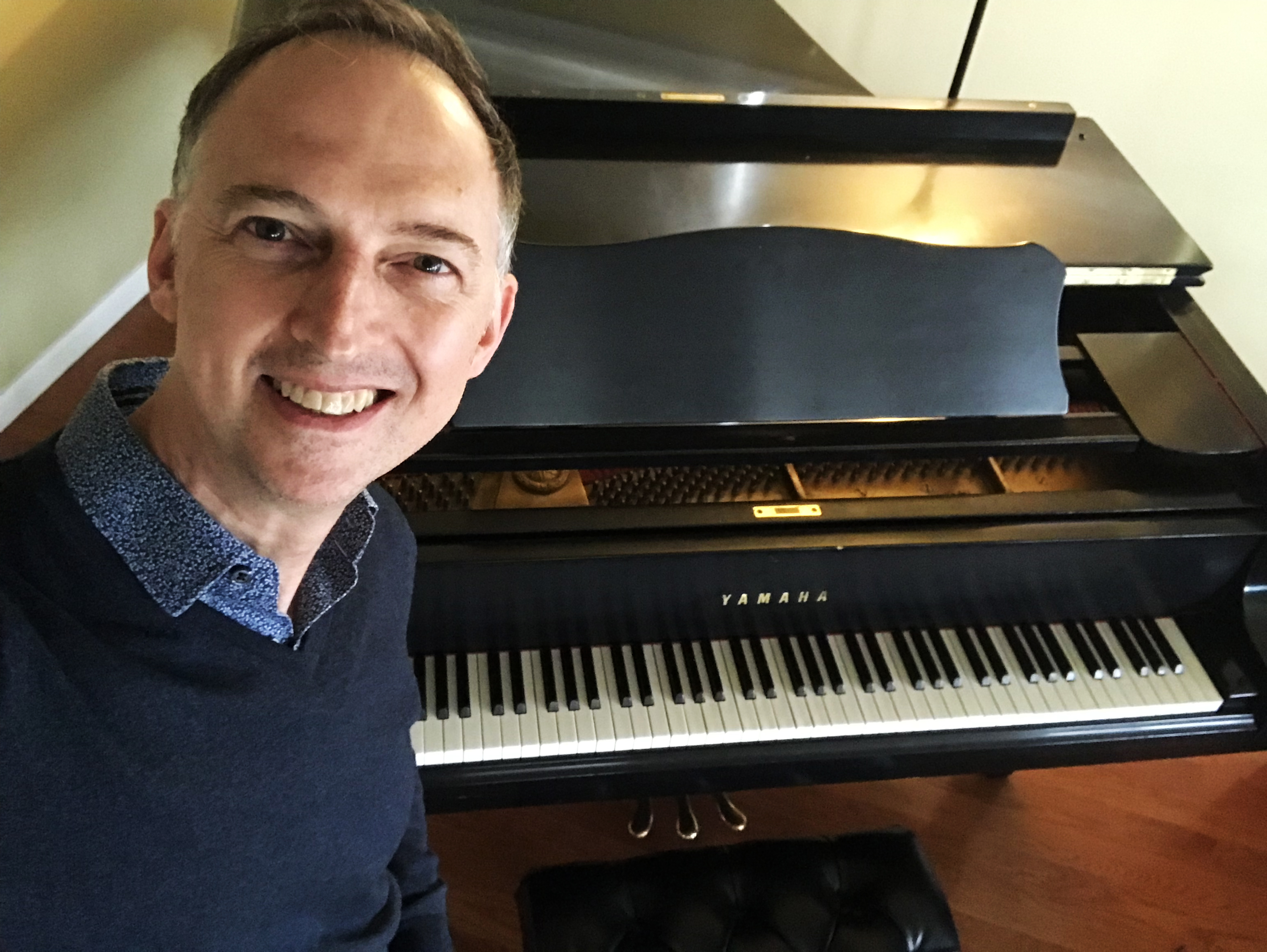 Photo: Mark Walker Collection
Photo: Mark Walker Collection
What are the biggest lessons you’ve learned about composition, after all of this work?
I think trusting one’s intuition is very important. It’s easy enough to just sit down with an idea, but the questions are “Now, what? What do you do? Where do you go?” I can blame that on the fact that I’m a Libra, but I admit that sometimes I think “I’m never going to get through this.” Somehow, something always happens and comes to me. It might not be in the same sitting and it can take a lot of time and focus. But every composer has to trust that the muse will show up sooner or later.
It also taught me about time management. One of the most challenging things for me about studying at a university was that I had all of those classes and a lot of assignments to complete, but not a lot of time to get it all done. I had to get all the work done while I was teaching. And it was even more of a challenge when gigs came back. But that was a forcing mechanism and a good thing, because it trained me to use my time more wisely.
Other lessons learned involve details, such as ensuring everything was correctly notated in the right keys, without errors. I paid more attention to nomenclature and transposition, because I was writing for players. A very important lesson was how to get the best performances out of players you’re writing for, which is something I learned from Professor Holmes. He would talk to me about sections and how to interpret a phrase I wrote, and all of a sudden I would realize he knew more about the intention of what I wrote than I did. He’s a true professional. So, there’s the expression of each line I’ve written that has to be considered as well. All of it defines the personality of the work, as well as the dynamics, and phrasing. Again, these are things Lyle and Ralph emphasized all the time. I’m grateful for all of these experiences.
You included six original pieces on your 2019 debut solo album You Get What You Give. Contrast the process you took with it, compared to what you’re capable of doing now.
What I did for that is a lot different, compared to how I’d work after all of this study. Back then, I remember in terms of composing, Ralph Towner saying he’d just drool on the piano until he found something or bang two rocks together until he got a spark, and something would eventually come out. So, the tune “Deep Six” from that record, which I also recorded with Oregon, came about from me playing with fourth voicings, trying to get something that sounded like Miles Davis. And a melody came out of that. I input it into software called Reason, so I could hear it in real time, because I’m not a piano player. Most of the tunes came together that way.
The album also happened because I received a recording grant from Berklee, got a band together, and was on a tight deadline with only two weeks until the session. So, it was “Okay, boom—let’s write some music.” The piece “Akumbia” came out of playing two chords. I also stole some things from Ralph, and he knew I did, but he didn’t mind too much. [laughs]
I no longer use sequencing software to construct things for the most part. I think about the voice leading and work it out at the piano. I’ll put it directly into Sibelius for notation. Now I can write more complete arrangements. If I wrote a “lead sheet” in the grad program at UMass, I’d get hell for it. We had to write complete arrangements, with more than just heads and solos. If I were writing You Get What You Give now, I’d have a lot more interludes, backgrounds, shout choruses, and the like.
I really admire the old school approach of people who can just look at a score and hear the whole thing in their heads, because they’ve seen the shapes and voicings so many times. They know exactly what’s going on and can immediately determine the right tempo and instrumentation to bring things to life.
How do you look back on You Get What You Give in terms of realizing the ambitions you had for your first solo project?
It was made because I wanted to start expressing what was inside. I'd had a band for a while that played some of my compositions live, involving mostly Berklee faculty and students. It included Aubrey Johnson on vocals, the guitarist Tim Miller, Dan Ian Smith on sax, the pianist Alain Mallet, Dave Limina on Hammond B3, Ernesto Diaz and Marcus Santos on percussion, and the bassist Andres Rotmistrovsky. So, it was almost like having a big band right there. I love the sound of the B3. The group was called Rhythm of the Américas.
After I got the studio grant from Berklee, we just went in and recorded the repertoire with a slightly different lineup. The album also includes some sessions that go back 12 years. I used Mark Wessel, the same engineer, for both sessions, which brought continuity to the album. The intention was to get my stuff out to the world, because I’ve been a sideman for so long. It was very gratifying to release it and go out and do gigs under my name. I also saw how tough it was to make it work and get people out to shows.
I also wanted to write in different genres to understand them more, like Afro-Cuban, Brazilian, Colombian, and Uruguayan music. All the experiences I had traveling and performing with Paquito were reflected in that album. He’s also a guest on two tracks.
 Photo: Yamaha
Photo: Yamaha
You’re an expert at integrating many different global influences into your writing and rhythm approach. Describe the journey you took to arriving at the point where you could do this so seamlessly.
From the first gigs I was ever called for, I’ve been part of very eclectic bands that were always very mixed, internationally. To this day, I’m still involved in situations that are very eclectic. The first leader to call me was Steven Hashimoto, a bass player in Chicago, back in 1980. Our quartet also featured my dear friend, the guitarist Akio Sasajima, with whom I still record occasionally. When I was starting out in Chicago, I would take every conceivable type of gig including jazz, country and western, big band, funk, avant-garde rock, and whatever else needed a drummer. I observed “Everyone has to play everything to work.” Later, I realized that a lot of people just concentrate on one thing in their musical careers. But I enjoyed the challenge of playing a wide variety of music.
Another thing that changed my musical life was working with a group called Made in Brasil, back in 1982. It was later renamed Som Brasil. It was led by the pianist and vibist from Porto Allegre Brazil, Breno Sauer. His wife Neusa was the singer. Breno made a name for himself in the ‘60s, and I started learning Brazilian repertoire on that gig. A colleague of the singer would give me cassette tapes of what was happening in Brazil at the time. I didn't really know anything about Brazilian rhythms then, but I started falling in love with the music. Later, I wound up working with most of the people I heard on those tapes.
Paquito D’Rivera came to Chicago in 1989, and I was still playing with various people around town, doing session work, jingles, and live work. Paquito didn’t have a rhythm section for that engagement, so Howard Levy got a band together for him, and I was included in the lineup. We really clicked onstage and off. I remember after a whole week of playing with Paquito and hanging out with him until 5 am every morning, we had a few drinks and he said “Mark, you’re the only American drummer who gives a shit. You’ve got the gig!” I thought he’d just had a few too many that night, but sure enough, he called that summer, and I went to New York City with my drums to record Tico! Tico! with him, and go on tour. All of a sudden, I was thrust into this scene with Danilo Perez, Giovanni Hidalgo, Claudio Roditi, and all these absolutely incredible musicians. I hung out with Danilo a lot and he showed me a lot of the Afro-Cuban basics I didn’t know at the time.
One night, we were playing at the Blue Note and Michel Camilo popped in backstage. I loved his work. A couple of years before that, his music came on the radio, and I thought “This is so electrifying.” I had to park the car and wait until I found out who it was. So, when Michel showed up at the gig, I said “Man, I’d love to play with you sometime.” He said, “Why don’t you move to New York, and we’ll do some playing?” I thought to myself, “Well, I’m making good money in Chicago, and everything is going fine. Should I do this?” I decided to go for it. I moved to Brooklyn in 1995, but I didn’t know how to get in touch with Michel. So, I looked on the back of his CD and there was a phone number. I called it and his wife, who was also his manager, answered.
The next thing I knew, they sent me charts to work on. As it turned out, his drummer Horacio "El Negro" Hernández got the gig with Santana soon after that, and the drum chair opened up, so they called me for the gig.
To backtrack a bit, five years earlier, I got to record and tour with Paul McCandless’ group featuring Steve Rodby, Lyle Mays, and Fred Simon. I got a call from Lyle to tour with him. And when I was in Brazil in 1992 with Lyle, I also hooked up with Cesar Camargo Mariano, who is a pretty amazing arranger and keyboardist. Lyle, Cesar, and I would jam all night. Cesar then called me for some tours, in which I got to work with Michael Brecker and Diane Reeves, which was thrilling.
So, those things were big evolutions and instrumental for me. All of them involved bringing together different cultures in the music, and traveling around the world. Whenever people brought in new influences, I really tried to get a feel for the music. I got to travel all over South America, Europe, Asia, and the USA. I got so inspired by all the rhythms I heard in those places.
I try not to remain too static in my approach. When someone learns a Brazilian pattern, for example, they tend to just play that and it stays the same, like a loop. But when you get deeper into the music, you start being able to play variations, and that’s where the real music is, I think. I always try to get to the roots of everything, but also try to investigate it further, and take them into new places, and that’s what you’ll hear on You Get What You Give.
How do you communicate the need for an open-minded approach when working with your students at Berklee?
I try to lead by example. The first thing I do is play them the music. I want them to really hear everything that’s going on. Sometimes, if you hear an Afro-Cuban thing, it sounds like a jumble of percussion. But I try to get them to recognize the different instruments they’re hearing. Then they’ll take some of those different approaches and apply them to the drum set. I also try to get them to feel the overall rhythmic base of the music, like clave, for example.
In an ensemble setting, I'll explain how a lot of the music that we play comes from percussion, and how it's adapted to other instruments and ways of playing. I emphasize that this music is not static and there are ways of incorporating jazz harmony into it, in order to spark their creativity, so they can go deeper into it and gain inspiration to write. I always encourage drum students to write as much music as they can.
I also try to get rid of the term “Latin music,” because it’s so generic. I’m trying to be a diplomat for the music, so students better understand it and how big what it encompasses is. The wider the variety of music they’re presented with, the more they’ll appreciate the possibilities they’re capable of.
Paquito D’Rivera once told me a quote he heard from Carmen McCrae that said, "It's more important to listen than it is to play.” And that’s so true. If you play drums, they’re like the weather system of the music. What you do has to be appropriate for the situation. That’s another lesson for them. I also try to lead by example, sharing my experiences and performances with the students. I tell them “I’ve already made all the mistakes, so you won’t have to.”
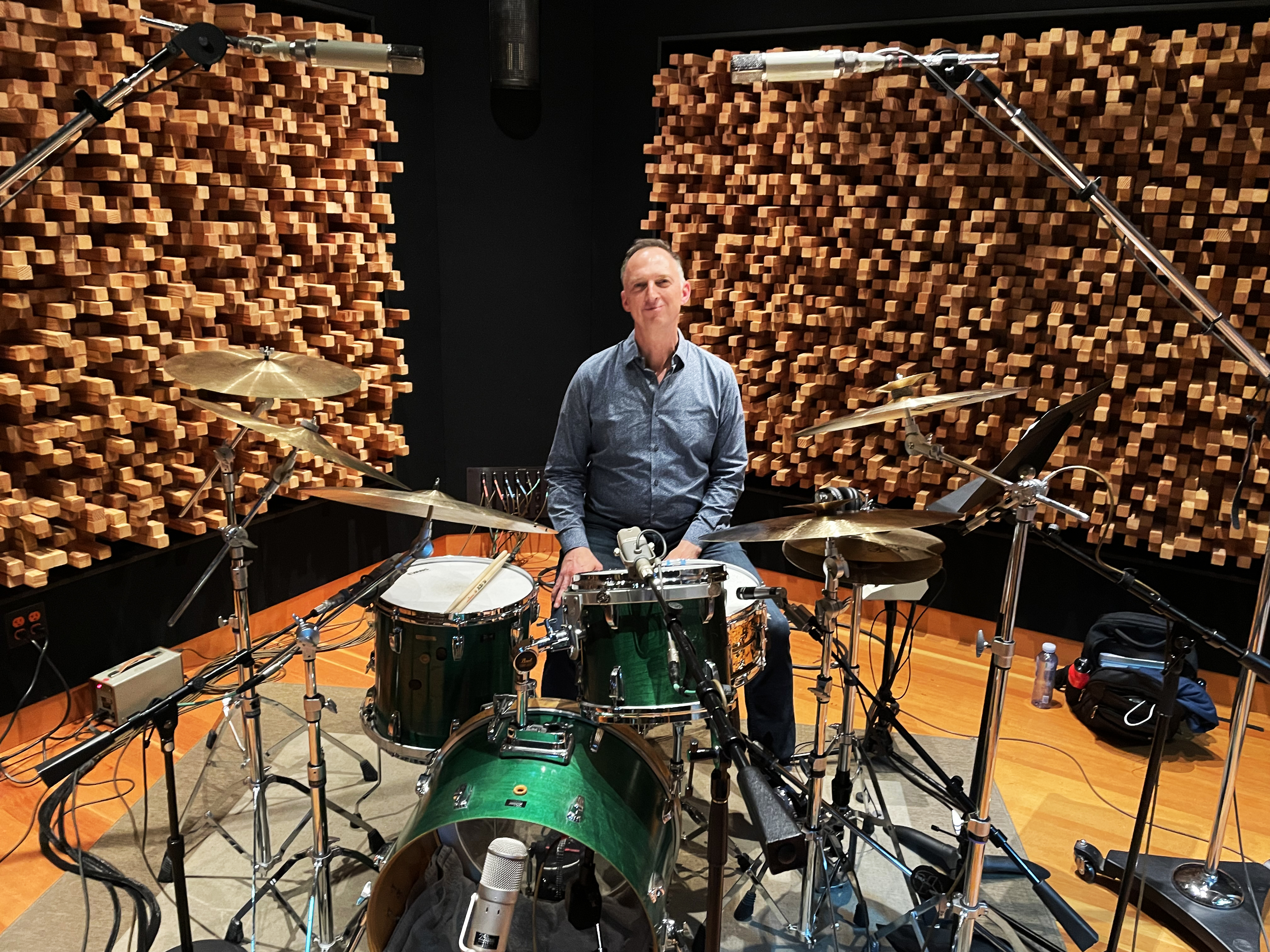 Mark Walker at 25th Street Recording, Oakland, CA, during sessions for Mariah Parker, Summer 2022 | Photo: Anil Prasad
Mark Walker at 25th Street Recording, Oakland, CA, during sessions for Mariah Parker, Summer 2022 | Photo: Anil Prasad
You’re here in the Bay Area to work on Mariah Parker’s forthcoming album. How did that opportunity come about?
Paul McCandless recommended me for the gig. He’s worked with her several times. She sent me her music and I thought “Wow, this is in the Oregon neighborhood,” especially with Paul on it. Mariah’s a wonderful composer. It’s a testament that after the sessions, we’re still singing her tunes. I really enjoy her music. She plays beautiful melodies, has a wonderful vibe, and chose a really nice combination of people for the sessions.
What was it like for you to work with McCandless after five years since Oregon last performed?
It was great to see him and hear his sound again. We’ve worked together so much that we just intuitively go for the same things when we’re playing. For me, it was “There’s that incredible sound again.” It took me back to all those decades we worked together in Oregon since 1991. Sometimes, I’ll hit a cymbal and he’s right there in perfect time, without any planning. He’s such a pro. Everything that comes out of his instruments is so unique to him. We almost have to try not to play together.
How did you first meet McCandless?
It was through Steve Rodby, who I first met through Fred Simon. Fred and I had been working together since the early ‘80s, when I first subbed for Paul Wertico in the Simon & Bard Group. The first time I met Paul was when I performed on his Premonition record from 1992, which was produced by Steve, and featured Fred. I was studying martial arts at the time and broke the fifth metacarpal on one hand the week before the session. Steve was furious of course, but I still wound up playing on most of the record on percussion and Will Kennedy came in and played drums. The track “Rainland” is the first time I met Lyle Mays. We did that track and went to dinner. I was a little nervous meeting Lyle, being one of my heroes, but he started cracking trombone jokes and broke the ice. He was a brilliant guy. Truly a genius, pointing the way for so many of us.
I felt very fortunate that Steve brought me in for Premonition. He recommended me to Lyle, and also got me on the sessions for Michael Manring’s Drastic Measures album. I also got to work on some film projects with Lyle as well. I consider Steve one of my professors, because he was so smart and articulate about the essence of the music we were working on. He’s also one of the most underrated bassists on the planet.
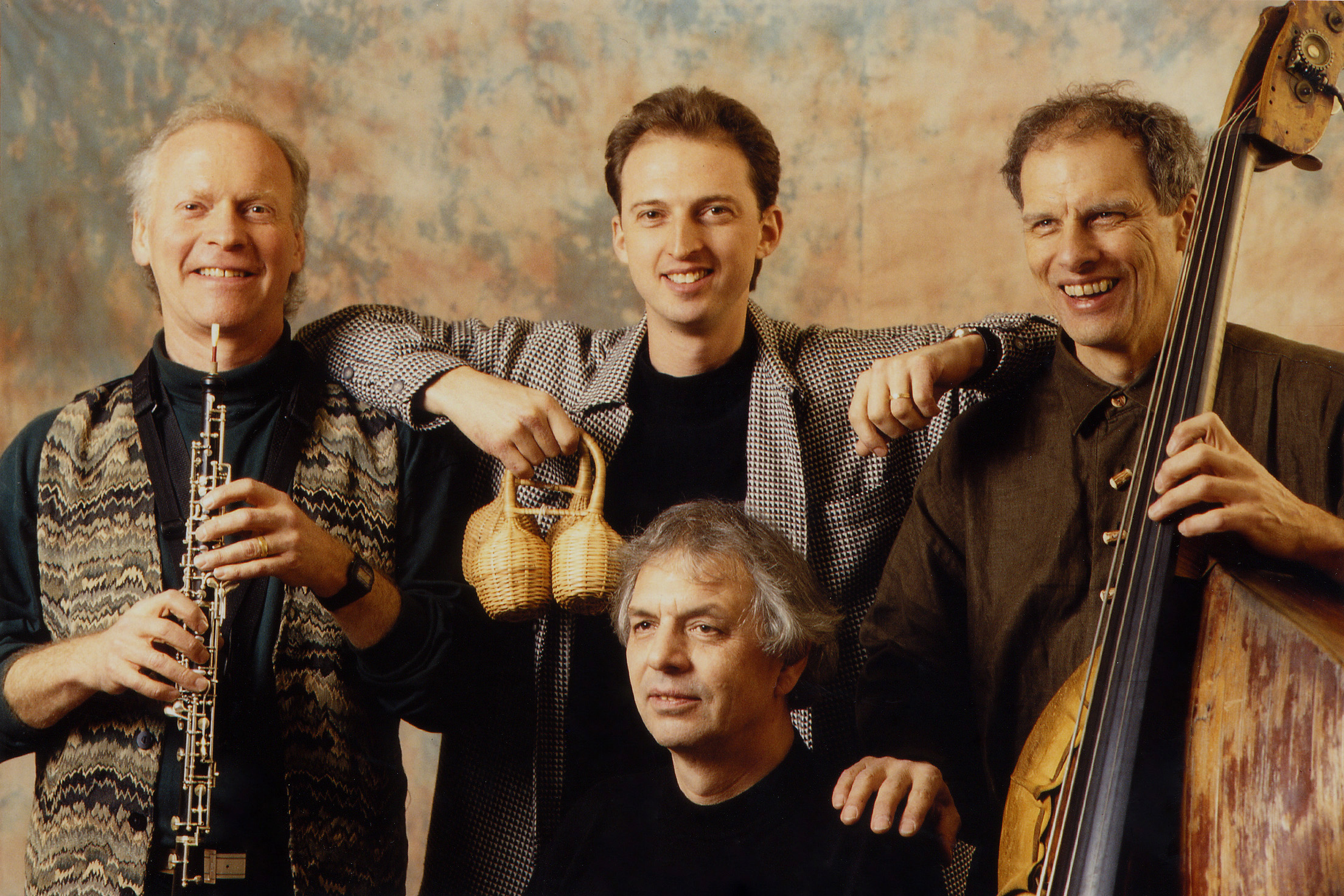 Oregon 2002: Paul McCandless, Mark Walker, Ralph Towner, and Glen Moore | Photo: Pio Scopalo
Oregon 2002: Paul McCandless, Mark Walker, Ralph Towner, and Glen Moore | Photo: Pio Scopalo
You’ve been a part of Oregon for more than a quarter century. Reflect on the journey you’ve experienced with the group.
I probably heard the first Oregon quartet with Collin Walcott when I was younger, but I don’t remember it. The first time I remember really listening to the group was with Trilok Gurtu on the 45th Parallel album. Then I went back and discovered their earlier albums. I thought they were fantastic and really unique. I loved the compositions, combination of sounds, the personalities, and how adventurous they were. I wasn’t able to tell what was a composed piece and what was a free piece. I thought it was all composed.
Ironically, one of the first musicians to ask me if I’d heard Oregon was Mark Messing, who went on to form Mucca Pazza, the marching band. He had a group called Soundstream in the 1980s in Chicago, and that was one of my first gigs in town. We used to play Ralph's “Icarus” on jazz gigs around Chicago and I would read it out of the Real Book.
When it came time for Oregon to make the 1996 Northwest Passage album, they wisely chose Steve Rodby to produce, and he called me for the sessions. Percussionist Arto Tunçboyaciyan played on several tracks, so they divided the record up between me and him. That was the first time I met Ralph and Glen Moore. Musically, we hit it off right away. I cobbled together a percussion setup from my basement full of drums and percussion in Chicago. I brought whatever I could grab and set it up at Chicago Recording Company, where the sessions took place. It wasn’t a standard drum set, but a hybrid setup with cymbals, hand percussion, snare drum, and various effects. I didn’t bring a bass drum, because I’d heard they didn’t want it, in order to make more room in the mix for the bass.
The first thing we recorded was one of Paul’s tunes, “Lost in the Hours.” We recorded that to a sequence that Paul had created, so we played to a click track. It was a beautiful piece with a mysterious vibe and a feeling of unfolding. What no-one realized at the time was that rhythmically, most of that tune worked in a particular direction of the Afro-Cuban clave pattern—not that it mattered to them. [laughs] Ralph played piano on the basic track and overdubbed a 12-string guitar solo. Watching and interacting with Ralph in the studio, I began getting to know his personality, which was very unique with a great sense of humor.
During the sessions, Ralph and I played a duet, with him playing 12-string. He just said, “Play one of those modern beats,” and off we went. That became “Over Your Shoulder.” Ralph and I had an instant telepathy. There was a real spark and a great energy as we played off of each other.
After the session, he said “You’ve got the gig if you want it. It doesn’t pay shit, though.” [laughs] Ralph isn’t like most leaders, because the group divided the money equally with everyone. I wasn’t used to that. It wasn’t a ton of money, but it was really generous of them to share it equally. In my opinion, these masters deserve private jets and first-class travel arrangements. I said “I don’t play tabla. Is that okay?” He jokingly said, “It’s okay. I’m sick of that sound.” [laughs]
We began the Northwest Passage tour in the fall of 1997. The initial idea was to not have a bass drum, but I ended up incorporating one. And then as the years went by, I started gravitating towards a more standard drum setup, but also incorporating dumbek and djembe. Oregon via Collin Walcott and Trilok Gurtu were known for tabla and hand percussion, so I wanted to reflect the roots of the Oregon sound, at least somewhat. After I joined the band, some of the fans of the original lineup would put me down for sounding like more of a traditional jazz drummer playing a drum set. The tabla is 5,000 years old. Isn’t that as traditional as you can get? At the end of the day, what do drummers and percussionists do? We hit things and they hopefully sound good in the music. That’s the bottom line. Collin and Trilok were both true masters, with whom I would study at the drop of a hat. That said, whenever you add a new element to something, it changes the whole. Ralph’s and Paul’s writing styles began to change once I was in the group. Perhaps they saw some new possibilities.
The first album we made with me as a member of the band was Oregon in Moscow from 2000. That was a wild experience. It was recorded and engineered by Rich Breen. I was set up in a separate studio from the orchestra. We had to hire the cleaning lady from the hotel we were staying in to come in and vacuum it because it was completely dusty. I was in a remote studio two stories up from the main studio in order for the sound of the drums to be separate from the orchestra. I was looking at the conductor through a small TV monitor, and sometimes keeping time for the orchestra as an “assistant conductor” via a wooden set of rods on a hi-hat, like a human click track, when I wasn’t playing a drum part.
The orchestra bailed halfway through the sessions because it had a tour in Japan to leave for, unbeknownst to anyone on our team. So, we had to replace them to finish the record. This was also made during a heatwave, and the air conditioning at the hotel wasn’t working. I also remember Rich having to repair every channel of the Neve console used in Moscow. However, it turned out to be such a beautiful record.
It was produced by Steve Rodby, who is such a master producer. He can hear and understand what’s happening as it’s going down. He doesn’t have to sit there and listen to playbacks. He makes notes as the music is being recorded. So, Steve and Rich were the secret weapons of the project, not to mention the band. I also started discovering new ways of playing that were different from how I was used to working with the band, which you really hear on “Anthem.” I took a much more spacious and spare approach. It was a new concept for the band. I didn’t know if it would work, but it did, and they liked it. I wish Oregon in Moscow could have been recorded today. I could have contributed a piece for orchestra. [laughs]
We went on to do a lot of touring over the next two decades. It was so great getting to know everyone and to travel with them. I learned so much working with Ralph in terms of composition. Every record was an amazing experience. I loved playing the free improvised pieces with the group. We weren’t afraid to experiment and see what worked and what didn’t. We would just let things flow. It was a challenge in not thinking.
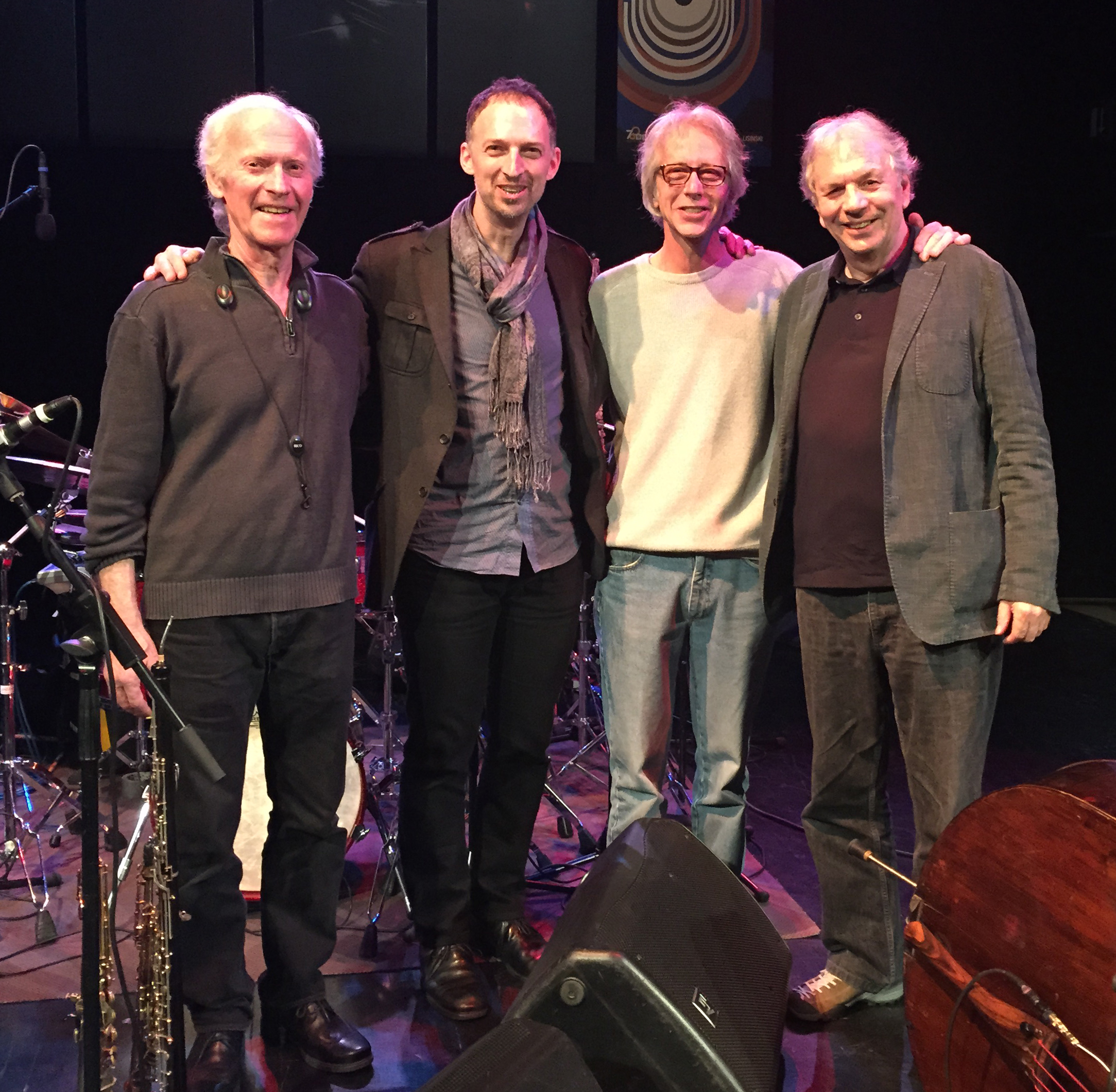 Oregon 2017: Paul McCandless, Mark Walker, Paolino Dalla Porta, and Ralph Towner | Photo: Mark Walker Collection
Oregon 2017: Paul McCandless, Mark Walker, Paolino Dalla Porta, and Ralph Towner | Photo: Mark Walker Collection
Oregon’s last studio album, 2017’s Lantern, introduced Paolino Dalla Porta on bass, and proved to be one of the group’s strongest late-era recordings. What are your thoughts on it?
After Glen suddenly quit the band in 2015, Ralph called Paolino and he just fit perfectly. We all loved the album. Ralph remarked after the sessions that he thought it was the best album Oregon made since Collin was in the band. Paolino sounded so beautiful on it. He has such a great sound and sense of time. He contributed such wonderful solos and compositions. Again, changing an element changes the band.
The title track “Lantern” is a free piece, which came out really well. It was a challenge playing those free pieces in the studio, because it was such a different environment than the stage, but we always tried to remember the composition being formed in the moment, and that helped us focus. Ralph always said “When you make one sound, then another, you’re heading in a direction.” We’d follow that and hear where it would take us.
I’m very happy with the record. I think it’s a beautiful album, and the title is appropriate. It could represent the light that guides everyone forward, musically, if it’s the last studio album we make.
I don’t think it’s necessarily the last Oregon album that will come out. We did some recordings with the HR Big Band in Hamburg in 2015, directed and arranged by Jim McNeely. They were really nice sessions and those may come out, eventually. We just have to see if the band likes what they played and if someone is willing to put it out as an album. I’m sure there will be a few more recordings of the original quartet that will pop up, too.
You wrote a handful of compositions for Oregon over the years. Tell me about the process of realizing them.
“Deep Six” was the first piece I wrote for Oregon, and was a challenge for the group. It's an Afro-Cuban 6/8 piece, more or less, and there are a lot of moving parts. Paul had been playing on recording sessions forever, but Ralph and Glen were not really “session musicians'' per se, and we had to work really hard on that piece. In general, getting Ralph to work on somebody else’s composition is a feat, and I’m really honored he was willing to, especially given the fact that he played so many of his compositions on a variety of instruments—without any sheet music. We had to rehearse that tune very slowly for three days before we recorded it. In fact, I tell my own students, “The fastest way to get there is by playing it at the slowest tempo you can.” After we recorded it, I was really happy with it. There’s a little bit of an Oregon free improv in the middle of it, that we didn’t plan. That was the first time I was ever nominated for a Grammy Award under my name, and was really surprised to hear that the tune had been considered.
I did a version of “Deep Six” on You Get What You Give, which has an actual chord progression and transitions into hard bop mode. It’s a whole different thing, like a groove shuffle. But it was nice to hear Ralph’s interpretation, because he’s so well-versed in Brazilian music. But he calls what he does “abstracting it.” He could easily play calypso and samba for example, but he chooses to alter them and play in his own way, which is really the thing about Oregon. We never played a certain type of music in a strictly traditional way. We played the Oregon version of it. In terms of swing feel, it was more based on the interactive style of Bill Evans and Scott LaFaro than, say, Oscar Peterson.
Another tune I composed for the Oregon album In Stride was “Nação,” which was written as a maracatu nação, which is an Afro-Brazilian dance procession performed during Carnaval in Recife. In Oregon, we always found a way to “abstract” any traditional style and adapt it to the band. Ralph later complained that the groove sounded like a washing machine. [laughs]
“Walkin’ the Walk,” from Lantern, was a post-bop, broken time-type tune, which I later turned into a big band chart. Another very complicated part for Ralph to play, but he just killed it.
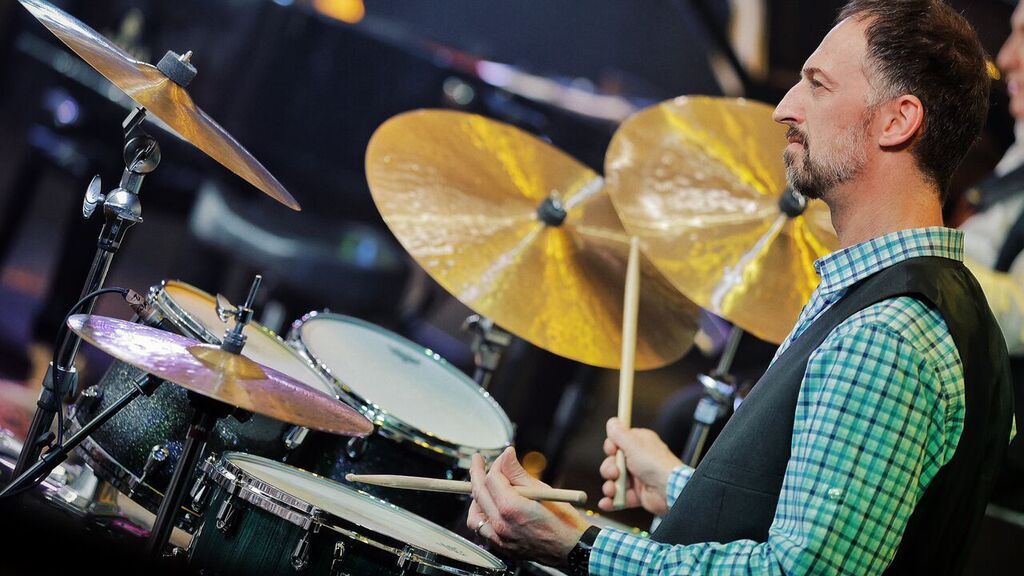 Photo: Mark Walker Collection
Photo: Mark Walker Collection
I believe Oregon is one of most influential groups in the history of music, in terms of its unprecedented skill in meshing genres and influences. What’s your view on its importance?
Oregon is extremely important and influential, but I think it never got the recognition it deserved. The band took all these different world influences and played them in its own way. It didn’t play Indian music, or Brazilian music. Rather, it played a hybrid music solidly rooted in jazz, with a Bill Evans sensibility. But the essence of the music was always there. Ralph was amazingly innovative in that when we played swing, he practically forbade Glen Moore to play quarter notes. Glen always had to play broken-up rhythms because Ralph said, “I don’t want to hear that thump, thump, thump.” It was so refreshing and different to hear, and was really a signature sound.
I meet people a lot that aren’t musicians that heard Oregon in the ‘70s. They’d say “Oh yeah, I used to hear them in college. They were amazing.” Unfortunately, most of them don’t know anything about the later records, which is a marketing issue and reflects how the music industry has changed. During the ‘70s, everything was much more open and experimental. Music wasn’t micro-marketed and micromanaged like it is now. So, the essence of the music came through and people across all walks of life would be exposed to it. We had all stripes of people at our concerts who really felt something special about the music. It was a beautiful thing to witness and feel.
As I listen to the older Oregon albums and Ralph’s solo music, I hear the genius in that music, and how they gelled as a group. They never sounded like anything but Oregon.
Every time New England Conservatory sends me a recommendation form for an honorary doctorate, I always recommend Ralph. I hope he’s recognized while he’s still with us.
What’s your perspective on the potential for Oregon to reunite?
I don’t know what the future may hold for Oregon. My standing joke is if Bill Gates sponsors an Oregon concert, we’ll be there in a hot minute. [laughs] The money would have to be at the level that Ralph and the rest of the band deserve, given where they are at their ages and experience. As I said, it should be first-class treatment for Ralph and Paul at least.
You never know. Ralph may come up with something he feels is right for Oregon, and he’ll miss the group, and want us back together. As Glen Moore used to say, “We try to find people to work with whose lives have been changed by Oregon.” It has always been a grassroots approach to getting the band on the road. So, who knows? Maybe there’s somebody who loves Oregon that’s amassed a fortune in cryptocurrency that will help us swing back into action. [laughs]
I’m just so honored to have had the experience with Oregon. How many gigs are there like that, where the music is about total honesty, without worrying about how you market it? They were just completely about the music. I was so thrilled to do it, and it definitely influenced me as a composer to work with those masters. It’s not like I can now compose like Ralph, but he really sparked me to explore composition.
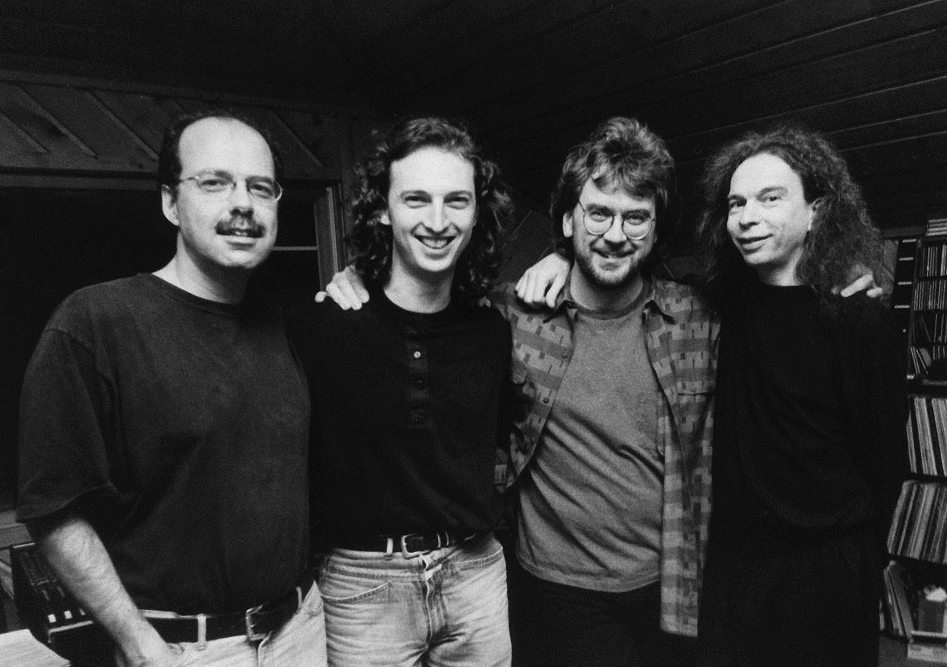 The Lyle Mays Quartet, Madison, WI, 1994: Bob Sheppard, Mark Walker, Steve Rodby, and Lyle Mays | Photo: Mark Walker Collection
The Lyle Mays Quartet, Madison, WI, 1994: Bob Sheppard, Mark Walker, Steve Rodby, and Lyle Mays | Photo: Mark Walker Collection
How do you look back at Lyle Mays’ legacy and the time you spent working with him?
Lyle was one of the true geniuses of jazz. He was a major figure and I think pretty much everybody knows his work and has huge respect for him. It was such a major loss. Lyle’s work is some of my favorite music.
I had such a fantastic journey with him. I learned so much from Lyle about expression and dynamics. He really instilled the idea of putting the composition first. He was also a great guy to hang out with. We used to play chess and he always beat me, except once when he was a little tipsy and being interviewed at the same time. He was a very sociable person and loved to hang.
In 2015, SWR in Germany released a live recording from 1993 of the Lyle Mays Quartet I was a part of, called The Ludwigsburg Concert. Marc Johnson and Bob Sheppard were both on the gig. I admit I was nervous and intimidated by those guys, because they’d play things I’d never heard anyone else do. They would take things out harmonically and knew exactly what they were doing. I would think to myself “How can I possibly play anything after that?” And yet, I had to. I got used to it and it was a great learning experience.
Marc also helped me with some time problems I was having. He’d say, “Don’t cheat the beat.” Sometimes, I wouldn’t give the space the full value it deserved, and I really had to work on that. I learned how to take what they said to me and build on that.
Most of what I did with Lyle was with an acoustic quartet, with no synths. I did record some studio projects for the Rabbit Ears label with him, as well as the soundtrack to Mustang: The Hidden Kingdom.
For the last concert we did in 2010 in Kalamazoo Michigan, he did have the piano, plus a whole synth setup in the form of a laptop, and the lineup was me, Steve Rodby, Paul McCandless, and Aubrey Johnson. Again, that was a great learning experience. It was a real thrill to finally play “Highland Aire” live, because we never did it with the acoustic quartet. I also remember playing “Long Life” from his album titled Solo Improvisations for Expanded Piano.
You’ve worked with Paquito D'Rivera for 33 years across myriad projects. What are some of the highlights of that experience?
We first connected in 1989, when he played at George’s in Chicago with Claudio Roditi. We started working together after that and it has been a very eclectic and rewarding gig, with a lot of different rhythms and musicians that have come through the band from across the world. We’ve worked together in so many different types of ensembles, including small groups, big bands, and performances with orchestras. We’ve also had incredible people sit in with us, like Bebo Valdés, Jerry González, and Giovanni Hidalgo.
In 2000, he asked me to work on the Calle 54 film soundtrack, on a piece called “Panamericana Suite” which includes Argentinian, Venezuelan, and Cuban influences. That was another unique thing I got to do with him. He’s a really heavy composer. He’s mostly self-taught and just goes for it. It was also a thrill to have him play on a couple of tunes on You Get What You Give.
Paquito taught me a lot about music. He prefers to play softer, like a chamber group. So, I learned a lot about dynamics in Afro-Latin music, because most people approach it from a louder perspective.
When I moved to Boston, I trained one of my students, Eric Doob, to play the gig. He’s a very fine drummer who’s based in New York City. So now Paquito calls him when there’s a New York show and it would be too expensive to bring me over. I think it’s really good to pass things on to other people. Paquito gave me a chance when I was younger and less experienced, and I’m really happy for other people to get that opportunity.
We’ve had some great moments and high-profile gigs around the world with various size ensembles, and I am eternally grateful to Paquito for giving me a shot.
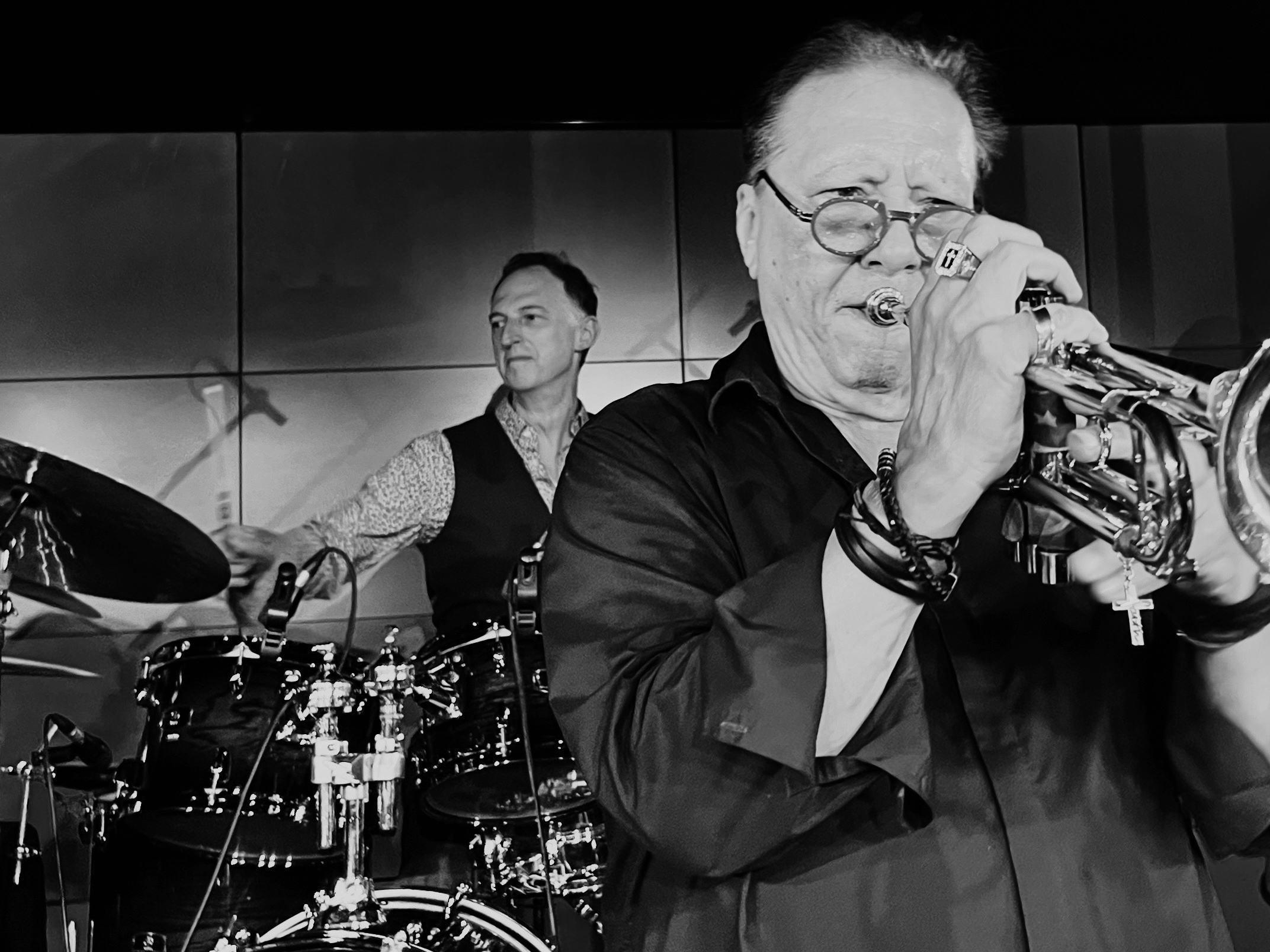 Mark Walker and Arturo Sandoval, Jazz Open Stuttgart, 2022 | Photo: Daniel Fleischmann
Mark Walker and Arturo Sandoval, Jazz Open Stuttgart, 2022 | Photo: Daniel Fleischmann
Your current performances with Arturo Sandoval are linked to your time with D'Rivera. Tell me about the connection and what that gig’s like for you.
We first worked together on Paquito’s 1991 album Reunion, which was the first time he and Arturo had worked together after Arturo defected from Cuba in 1980. That was one of the first albums I played on completely with Paquito, as well. At the time Arturo mentioned he needed a drummer, but I didn’t offer my services because I wanted to be loyal to Paquito.
In 2009, Arturo asked me to take part in an album called Mambo Nights with the WDR Big Band Köln, which was great. It has really nice arrangements by the trumpet player Michael Philip Mossman. After the sessions, Arturo turned to me and said, “Hey Mark, you’ve got that Latino shit down.”
After I completed my master’s degree in composition this year, Mike Tucker, Arturo’s sax player said “Arturo’s drummer might be leaving. Send him your stuff.” So, I did and the next day, sure enough, Arturo calls and says “I hear you’re interested. Let’s do some shows and you can make a commitment later, if you want the gig.” I agreed and inside, I was thinking, “Wow, is this really happening? Am I going to get on the road again?”
The next thing you know, we’re in San Diego playing on a big stage. With Arturo’s band, we explore the full dynamic range from soft ballads to heavy funk to Cherokee at a million miles per hour, not to mention samba and Timba. He wants his musicians to go for blood, so to speak. It’s very up-tempo, but he’s got his tender moments too. When he plays flugelhorn, he could totally fit in with Oregon. Overall, it’s a whole different aesthetic for me, it’s really fun, and he likes having my musical voice in the group. I’m very happy to be part of it. The whole experience has been extremely positive and a lot of fun.
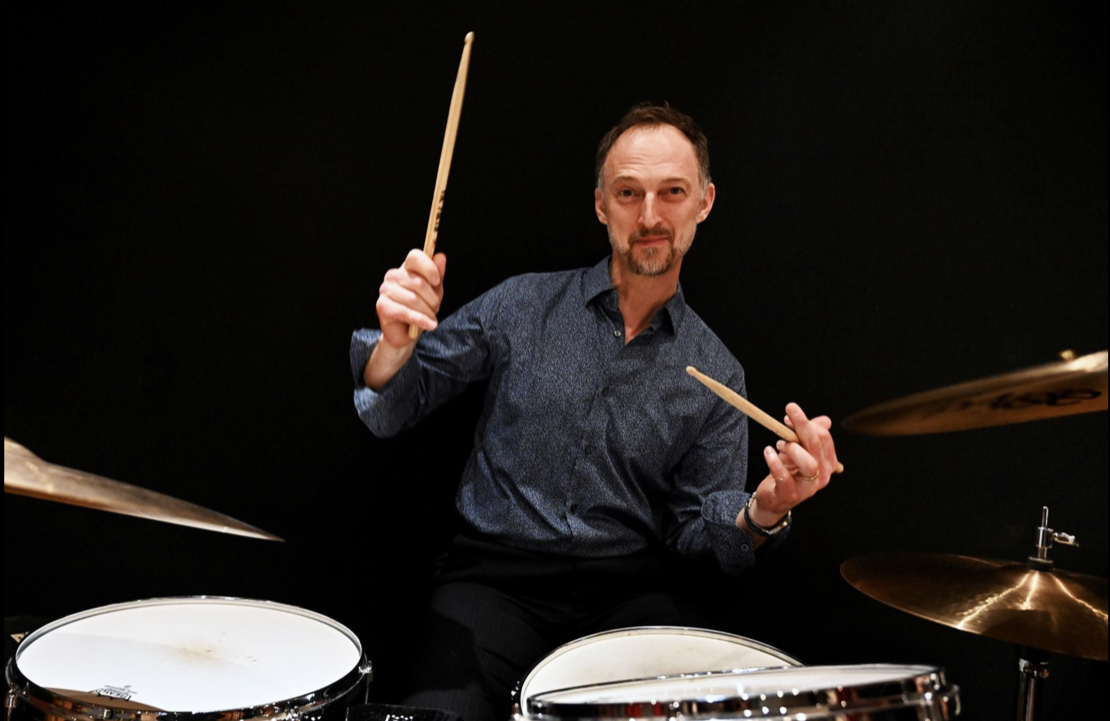 Photo: Henry Schwan
Photo: Henry Schwan
Is there a larger statement you'd like to relay about the meaning of bringing global cultures together through music?
Yes. There are the negative events and constant division we hear about on the news and from politicians, but there’s also plenty we don’t hear about. And that’s the good things happening with people respecting each other, loving one another, and collaborating with one another. Music is what brings people from all walks of life together. There’s a whole other worldview among people who believe “We’re all here to learn, grow, awaken, and transcend the negative.” Maybe I’ll appear naïve, but I sincerely believe that. It’s just going to take some time for humans to get it together.
When I can remember to take a breath, stop thinking about everything, and just be, that’s when good things manifest in my life. My view is “Let’s listen beyond ourselves. Let’s get out of our own heads. Let’s share that spirit with each other, and treat others with love and kindness. Enjoy the music. And don’t mess up the groove.” [laughs]